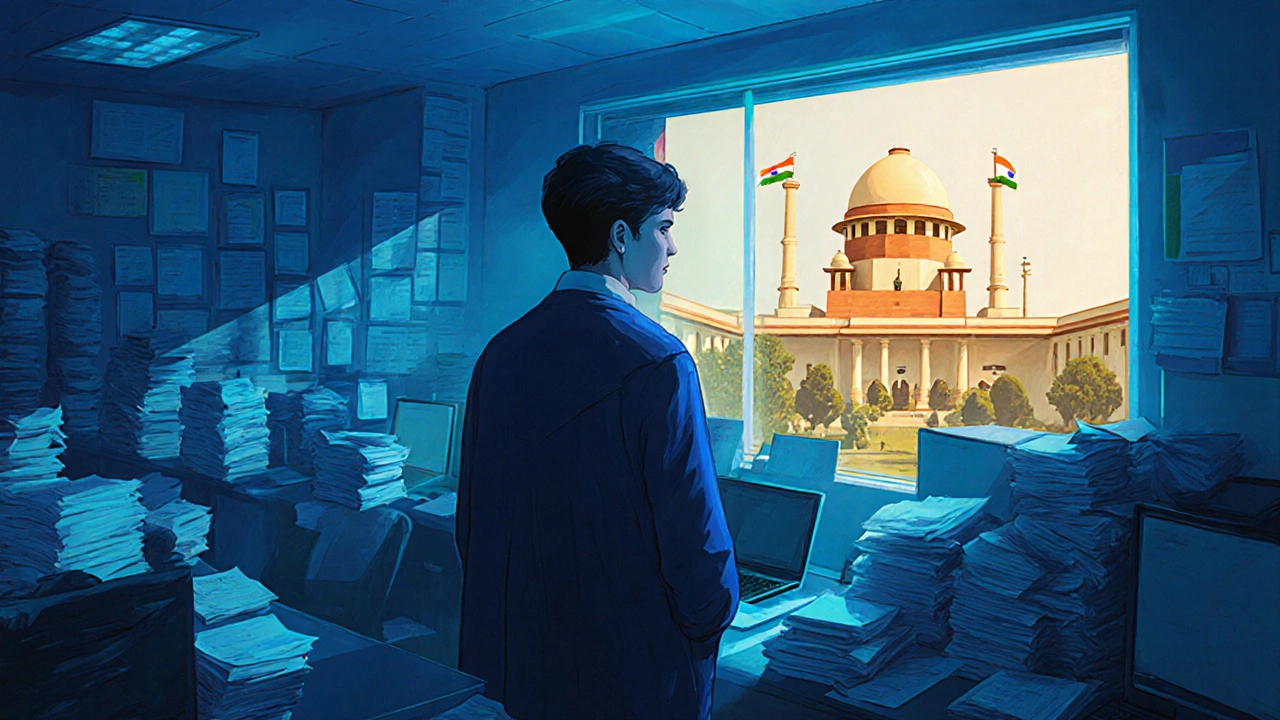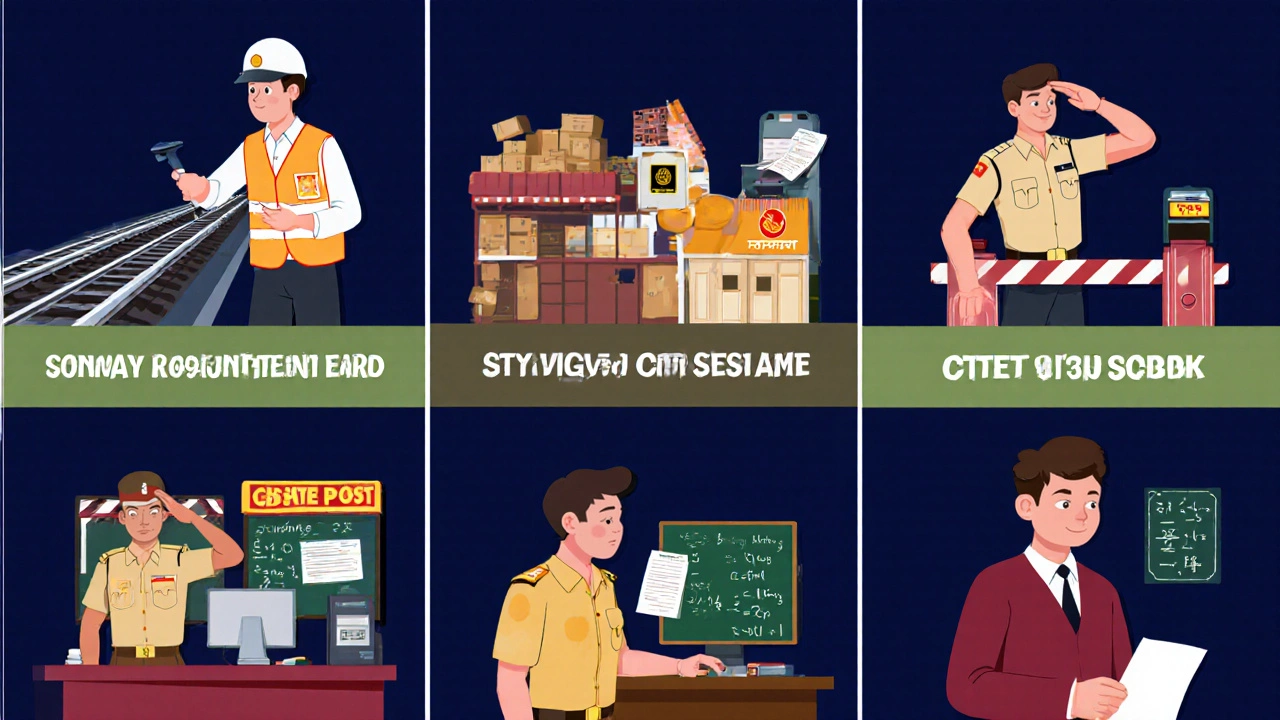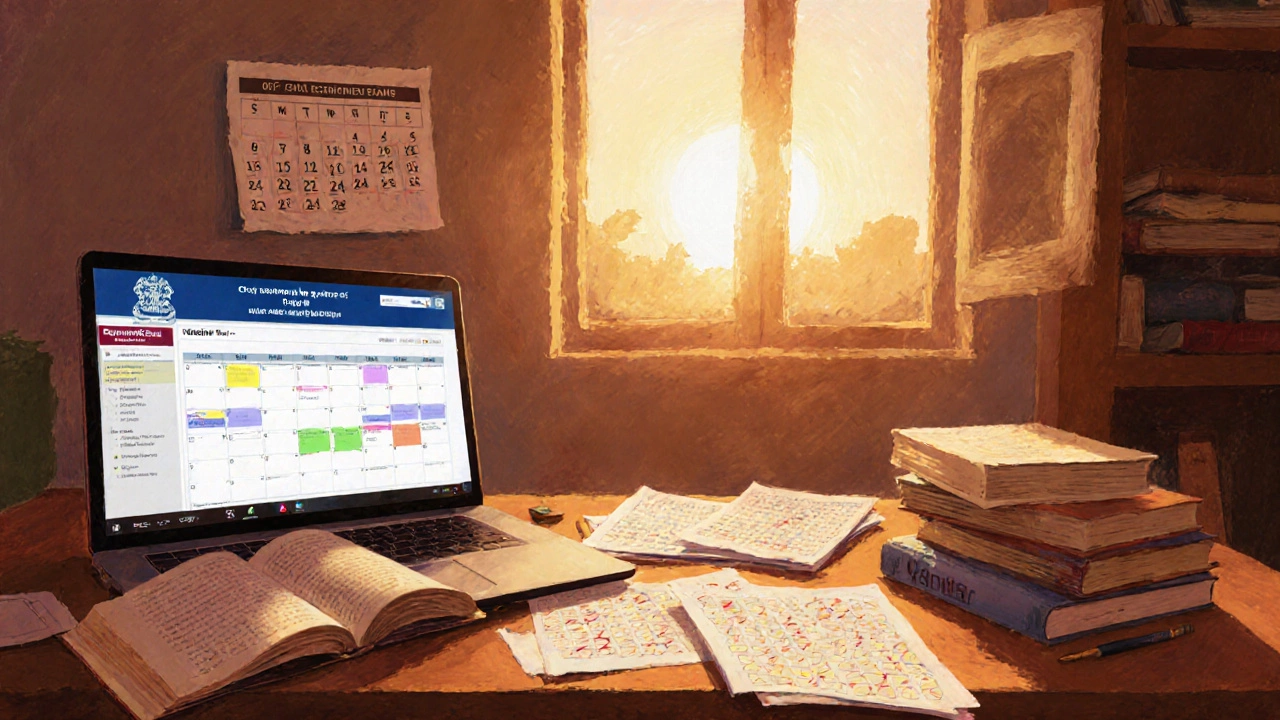
Government Job Easiness & Salary Calculator
Enter your education and age to see which government jobs match your profile!
Feeling stuck in the private‑sector rat race and dreaming of a secure, decent‑paying job? You’re not alone. Millions of fresh graduates and job‑seekers ask the same thing: which government job is best and easy to get? The answer isn’t a single role but a short list of positions where the recruitment process is clear, the competition is manageable, and the benefits stack up nicely. Below you’ll find a practical roadmap - from the jobs that require only a high school diploma to the ones that need a bachelor’s degree - plus eligibility basics, salary snapshots, and preparation tips that actually work in 2025.
Government job a role offered by a public sector organization that provides job security, structured growth, and statutory benefits is the umbrella term for all the posts we’ll discuss. While the term can cover senior bureaucratic posts, the focus here is on entry‑level or mid‑level positions that most aspirants can target without years of prior experience.
Why These Jobs Are Considered “Easy to Get”
- Recruitment agencies (SSC, RRB, IBPS) publish detailed syllabi and timelines, leaving little guesswork.
- Selection stages usually involve a single written exam and a basic interview, unlike the multi‑stage UPSC process.
- Eligibility criteria are straightforward - mainly age, educational qualification, and a minimum percentage.
- Vacancy numbers are relatively high, spreading the competition thinly across multiple states.
Let’s break down the top contenders.
1. SSC CGL Staff Selection Commission Combined Graduate Level exam for clerical and junior officer posts
SSC CGL (Combined Graduate Level) is the flagship exam for those with a bachelor's degree. It fills roles like Assistant Audit Officer, Junior Engineer, and Tax Assistant across ministries and public‑sector undertakings. Here’s why it’s a favorite:
- Four‑tiered exam - you can stop after TierII if you prefer a clerical post.
- Clear cutoff trends; last year’s qualifying marks hovered around 120‑130 out of 200, manageable with focused preparation.
- Starting salary ranges from ₹30,000 to ₹45,000 per month, plus allowances.
Eligibility: Age 21‑32, graduate in any discipline, minimum 45% marks (40% for reserved categories).
2. RRB Railway Recruitment Board conducts exams for various technical and non‑technical posts in Indian Railways
Indian Railways is one of the world’s largest employers. RRB exams cover positions such as Junior Engineer, Trackman, and Station Master.
- Technical posts (JE) need engineering diplomas; non‑technical posts accept 10+2 with relevant subjects.
- Vacancies often exceed 30,000 across the country, diluting competition.
- Starting pay: up to ₹55,000 per month for engineering roles; ₹25,000‑₹35,000 for clerical posts.
Eligibility: Age 18‑33 (relaxable), specific educational qualifications per post, and a valid Railway Recruitment Board registration.
3. India Post Postal Department of India offering roles like Postal Assistant and Sorting Assistant
India Post recruitment has surged after the 2024 digitisation drive. Jobs include Postal Assistant (PA), Sorting Assistant (SA), and Assistant Section Officer (ASO).
- Only 10+2 plus a minimum of 45% marks needed for PA/SA.
- Exam pattern: objective test followed by a skill‑test (typing/typing‑speed) and document verification.
- Starting salary: ₹23,000‑₹27,000 per month, with housing and travel allowances.
Eligibility: Age 18‑30 (relaxable), Indian citizenship, and physical fitness for certain posts.

4. State Police Constable Entry‑level law‑enforcement post in state police forces, recruited through state public service commissions
Every state runs its own constable recruitment. The job offers a respectable entry point into public service.
- Educational requirement: 10+2 with any stream; some states ask for 12th with a minimum percentage.
- Physical standards are strict, but training facilities are excellent.
- Starting salary: ₹25,000‑₹30,000 per month plus uniform allowance and pension scheme.
Eligibility: Age 18‑23 (relaxable up to 28), Indian citizenship, and no criminal record.
5. IBPS Clerk Banking recruitment for clerical posts across public sector banks through Institute of Banking Personnel Selection
IBPS conducts a yearly clerk exam for 40+ public sector banks, making it a massive entry point into the banking sector.
- Eligibility: 10+2 with 60% marks (55% for SC/ST).
- Exam has three phases - Preliminary, Mains, and Interview - but each phase is straightforward.
- Starting salary: ₹23,000‑₹30,000 per month, plus pension, medical, and housing benefits after 5 years.
Age limit: 20‑30 years (relaxable).
6. CTET Teacher Central Teacher Eligibility Test for teaching positions in central schools and government-aided institutions
For those with a B.Ed or a postgraduate degree in the relevant subject, CTET opens doors to teaching in Kendriya Vidyalayas, Navodaya Vidyalayas, and state schools.
- Exam is a single objective paper; clearing it makes you eligible for a wide range of schools.
- Starting pay: varies by state, but central postings start at ₹35,000 per month with regular increments.
Eligibility: Bachelor's degree plus B.Ed, age 21‑45 years.
7. UPSC Civil Services All‑India competitive exam for IAS, IPS, IFS and other elite services - listed here for contrast
While UPSC is prestigious, it’s anything but “easy”. Including it helps you see the spectrum: high effort, high reward versus low‑effort, solid‑reward jobs.
- Requires a 3‑year preparation cycle, multiple papers, and an interview.
- Starting salary: ₹56,100 per month (plus allowances), but the selection rate is under 0.1%.
Eligibility: Graduate degree, age 21‑32 years.
Quick Comparison Table
| Job | Difficulty | Starting Salary (₹/month) | Education Required | Age Limit |
|---|---|---|---|---|
| SSC CGL | Moderate | 30,000‑45,000 | Graduate | 21‑32 |
| RRB (JE/Non‑Tech) | Easy‑Moderate | 25,000‑55,000 | 10+2 / Diploma / Engineer | 18‑33 |
| India Post PA/SA | Easy | 23,000‑27,000 | 10+2 (45%+) | 18‑30 |
| State Police Constable | Easy‑Moderate | 25,000‑30,000 | 10+2 | 18‑23 (up to 28) |
| IBPS Clerk | Easy | 23,000‑30,000 | 10+2 (60%+) | 20‑30 |
| CTET Teacher | Easy‑Moderate | 35,000‑45,000 | B.Ed + Bachelor | 21‑45 |
| UPSC Civil Services | Hard | 56,100+ | Graduate | 21‑32 |

How to Prepare Efficiently for These Exams
Preparation is the real differentiator. Below are proven steps that work across the board.
- Get the official syllabus. Each recruiting body (SSC, RRB, IBPS, etc.) publishes a detailed syllabus. Download it and keep it open while you study.
- Build a 12‑week timetable. Allocate 2‑3 hours daily for core subjects (English, Quantitative Aptitude, Reasoning, General Awareness) and 1 hour for mock tests.
- Use dedicated prep books. For SSC, try "Quantitative Aptitude for SSC CGL" by R.S. Aggarwal. For RRB, "Railway Recruitment Exam Guide" by Disha. For IBPS, "Bank PO/Clerk Guide" by Arihant.
- Join a focused online course. Platforms like Unacademy and Gradeup offer live classes tailored to each exam’s pattern. Look for courses that include weekly doubt‑clearing sessions.
- Practice with past papers. Solve at least three years of previous question papers. Notice recurring topics - they make up ~40% of the exam.
- Take timed mock tests. Simulate the exact exam environment. Analyze errors and adjust your study plan accordingly.
- Stay updated on current affairs. For General Awareness, read a concise daily news digest (e.g., The Hindu’s “Daily Brief” or PIB releases). Focus on national events, government schemes, and basic economy.
Pro tip: create a “mistake bank”. Every time you get a question wrong, write down the concept, the correct answer, and a short rule‑of‑thumb. Review this bank weekly.
Application Process - What to Expect
Once you’re ready, the actual application is a breeze. Here’s a generic flow that applies to most of the jobs listed:
- Visit the official recruitment portal (e.g., ssc.nic.in, rrbcdg.gov.in, ibps.in).
- Create a user ID and password. Keep them safe; you’ll need them for future logins.
- Fill in personal details, educational qualifications, and upload scanned documents (photo, signature, marksheet). Ensure the file size meets the portal’s limit.
- Pay the application fee (usually ₹300‑₹500) via net banking or UPI.
- Submit the form and note the roll number. This is your identifier for the admit card.
- Download the admit card a week before the exam date. Print it on plain paper.
After the written exam, keep an eye on the result portal for cutoff scores. If you qualify, you’ll receive a call‑letter for the next stage (interview, skill test, etc.).
Common Pitfalls and How to Avoid Them
- Skipping eligibility checks. Many candidates apply only to discover they’re over the age limit after paying fees.
- Ignoring document specifications. Wrong file formats or blurred scans lead to disqualification.
- Relying on one study source. Diversity prevents blind spots - combine books, video lessons, and mock tests.
- Neglecting health. Long study hours can cause fatigue. Take short breaks, stay hydrated, and get enough sleep.
Next Steps After Getting the Job
Landing the post is just the beginning. To make the most of it:
- Complete the mandatory training (most posts have a 3‑month induction).
- Apply for the pension and insurance schemes within the first year.
- Set up a professional development plan - many ministries offer skill‑upgrade courses that boost promotion chances.
- Network with senior colleagues; mentorship can fast‑track your career.
Remember, government jobs offer stability, but growth depends on performance and continuous learning.
Frequently Asked Questions
What are the easiest government jobs to get in 2025?
The most accessible roles are India Post Postal Assistant, IBPS Clerk, SSC CGL clerical posts, and State Police Constable. They require only 10+2 education, have clear selection stages, and publish high vacancy numbers each year.
How much does an SSC CGL clerk earn at the start?
A newly appointed SSC CGL clerk draws a basic pay of around ₹30,000 per month, plus dearness allowance, house rent allowance, and medical benefits, taking the total package to about ₹45,000-₹55,000.
What is the age limit for RRB Junior Engineer?
General candidates must be between 18 and 33 years. Age relaxations are provided for SC/ST, OBC, and ex‑servicemen as per government norms.
Do I need a B.Ed to apply for CTET?
Yes. The eligibility criteria mandates a bachelor’s degree plus a recognized B.Ed or a postgraduate degree in the concerned subject. Without B.Ed, the application is rejected.
How can I track my application status after the exam?
Log in to the official recruitment portal using your roll number and password. The result section will show your cutoff status, rank, and any further letters (interview, skill test, etc.). Some boards also send SMS alerts.
More Articles

Building a Successful Government Career: Essential Steps and Tips
Starting a career in government can be a rewarding choice, offering stability, benefits, and the opportunity to make a positive impact on society. Understanding the different sectors and positions available is crucial for tailoring your preparation efforts. From mastering the needed qualifications to networking effectively within the public sector, every step is pivotal in securing a role. Additionally, utilizing available resources and staying informed about examination updates can enhance your chances of success. With the right strategies, you can pave a smooth path toward a fulfilling career in government.

How to Get Hired by the US Government: Steps Made Simple
Getting a job with the US government is a whole different game from private companies. This article breaks down the process, explains where to start, and gives you insider tips on making your application stand out. You'll find out how to use USAJOBS, what to expect during the hiring process, and how to handle things like security clearance. If you're looking for a steady, rewarding career, these tips will help you land that government job.

Which Branch of MBBS Is Highest Paid? Your Guide to Smart Career Choices
Trying to pick the highest paid branch after MBBS? This article breaks down which specialties top the salary charts and what influences doctors' pay in India. It covers how competition, demand, private vs government jobs, and additional qualifications can change your earning potential. Get useful facts, real-world salary ranges, and tips for making a smart choice after NEET. Make a practical plan for a rewarding medical career beyond the entrance test.
